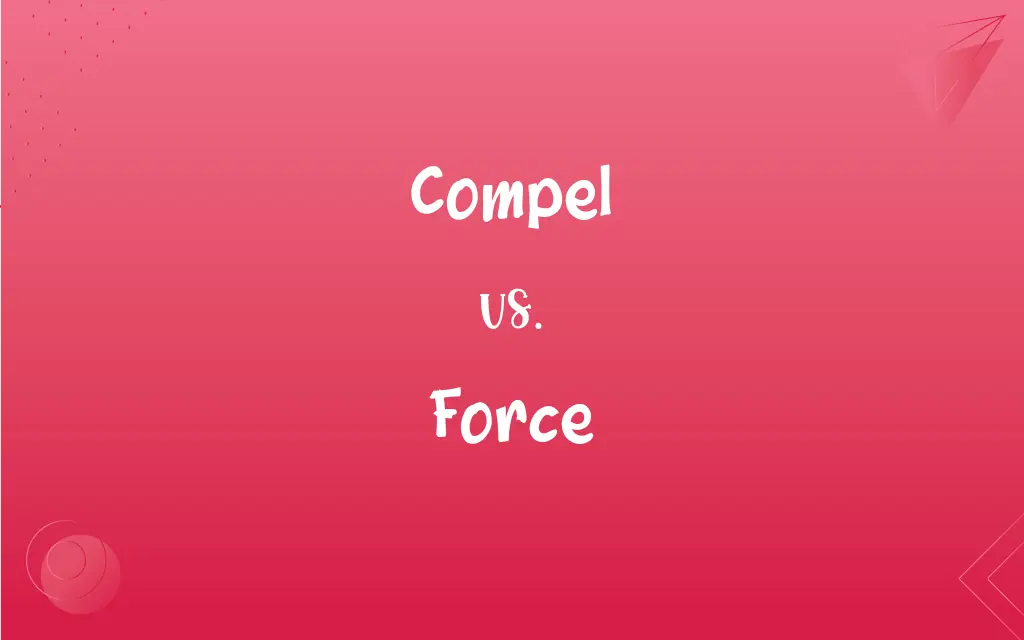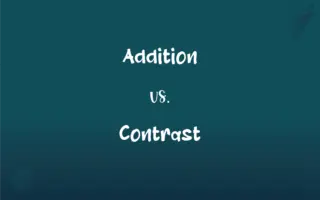Compel vs. Force: What's the Difference?
Edited by Aimie Carlson || By Janet White || Updated on February 5, 2024
Compel means to urge irresistibly or necessitate by moral, legal, or physical means; force implies applying power to make someone do something against their will.

Key Differences
Compel is often used to describe a situation where someone is driven to act by an irresistible urge or a necessity that cannot be avoided, often involving moral, legal, or psychological pressure. Force, in contrast, suggests the use of physical strength, power, or authority to make someone do something against their wishes, emphasizing coercion and the overcoming of resistance.
Compelling someone often involves an element of persuasion or the presence of circumstances that leave no reasonable alternative but to comply. For instance, a compelling argument might convince someone to change their mind without physical coercion. Forcing someone, however, typically bypasses persuasion and involves direct action to ensure compliance, such as physical restraint or the threat of immediate consequences.
The concept of compulsion carries a sense of inevitability or necessity, suggesting that the actions or decisions are the result of external pressures that are hard to resist. Force, however, is more direct and blunt, implying an overt exertion of power to achieve compliance, often disregarding the individual's autonomy or consent.
In legal and ethical discussions, to compel is to require action or inaction through legal authority or moral persuasion, while to force is to exert control in a more unilateral manner, often disregarding the individual's rights or desires. This distinction highlights the nuances in how authority, power, and influence are exercised in different contexts.
Despite their differences, both terms imply a lack of freedom or choice for the individual on the receiving end. Whether through compulsion or force, the individual's ability to act according to their own volition is significantly constrained, underscoring the power dynamics at play in situations where these terms are applicable.
ADVERTISEMENT
Comparison Chart
Nature of Action
Psychological, moral, or legal pressure
Physical power or authority
Volition of Subject
Reduced autonomy, under pressure or necessity
Overcome, often against will
Means Used
Persuasion, necessity, inevitability
Coercion, physical restraint
Context of Use
Often legal, ethical, or persuasive contexts
Typically involves overt exertion of power
Emotional Connotation
Can be less aggressive, more about persuasion
Generally seen as more aggressive or coercive
ADVERTISEMENT
Compel and Force Definitions
Compel
To necessitate by force of circumstance.
Financial difficulties compelled him to reconsider his plans.
Force
To make something happen or be accepted.
They forced the policy change through despite opposition.
Compel
To urge irresistibly.
The evidence compelled the jury to return a guilty verdict.
Force
Physical power or strength.
The door was opened by force.
Compel
To enforce action through legal or moral authority.
The court compelled the company to pay damages.
Force
Coercion or compulsion, especially with violence.
He took the crown by force.
Compel
To drive or bring about by argument or reasoning.
Her arguments compelled us to see the issue in a new light.
Force
Influence or power used to achieve a result.
She used her influence as a force for positive change.
Compel
To exert a strong, irresistible force on.
The novel's plot compels readers to keep turning pages.
Force
A group with a capacity to fight or defend.
The police force responded to the emergency.
Compel
To force (a person) to do something; drive or constrain
The court compelled the company to pay full restitution. My conscience compels me to speak out.
Force
The capacity to do work or cause physical change; energy, strength, or active power
The force of an explosion.
Compel
To necessitate or require, as by force of circumstance; demand
Growing riots compelled the evacuation of the embassy.
Force
Power made operative against resistance; exertion
Use force in driving a nail.
Compel
To exert a strong, irresistible force on; sway
"The land, in a certain, very real way, compels the minds of the people" (Barry Lopez).
FAQs
Can legal actions compel behavior?
Yes, legal mandates can compel individuals or entities to act in certain ways.
How does force differ from compulsion?
Force involves physical power or authority, whereas compulsion can include moral or psychological pressure.
What does it mean to compel someone?
To urge or drive someone to do something through persuasion or necessity.
What makes an action forceful?
The use of power or authority to overcome resistance.
Is physical restraint a form of force or compulsion?
Physical restraint is considered a form of force.
Can someone be compelled to act against their morals?
Yes, through intense pressure or circumstances, though this raises ethical concerns.
Is force always violent?
Force can be violent but also refers to any exertion of power to achieve compliance.
What role does persuasion play in compulsion?
Persuasion can be a tool for compulsion, especially in non-coercive contexts.
Can economic pressure compel decisions?
Yes, economic necessity can compel individuals or organizations to make specific choices.
How do employers compel productivity?
Through incentives, expectations, and sometimes punitive measures.
Can compulsion be positive?
In some contexts, compulsion can lead to positive outcomes, especially if it motivates beneficial actions.
How do laws compel without using physical force?
Through the threat of legal consequences or sanctions.
How does one resist force?
Resistance can take many forms, from physical to legal challenges.
Can addiction compel behavior?
Addiction can compel behavior through psychological and physical dependency.
What distinguishes a force of nature from human force?
A force of nature is an uncontrollable natural event, while human force involves deliberate action or influence.
Can societal norms compel behavior?
Yes, societal norms can compel behavior through social pressure.
Is it ethical to use force in law enforcement?
Ethical use of force is subject to strict guidelines and public scrutiny.
How do emergencies compel immediate action?
The urgent nature of emergencies compels individuals to act swiftly to prevent harm.
Can an argument be compelling without being forceful?
Yes, compelling arguments can persuade through logic and evidence rather than coercion.
What is the role of force in political change?
Force can be a catalyst for political change but raises questions about legitimacy and ethics.
About Author
Written by
Janet WhiteJanet White has been an esteemed writer and blogger for Difference Wiki. Holding a Master's degree in Science and Medical Journalism from the prestigious Boston University, she has consistently demonstrated her expertise and passion for her field. When she's not immersed in her work, Janet relishes her time exercising, delving into a good book, and cherishing moments with friends and family.
Edited by
Aimie CarlsonAimie Carlson, holding a master's degree in English literature, is a fervent English language enthusiast. She lends her writing talents to Difference Wiki, a prominent website that specializes in comparisons, offering readers insightful analyses that both captivate and inform.































































